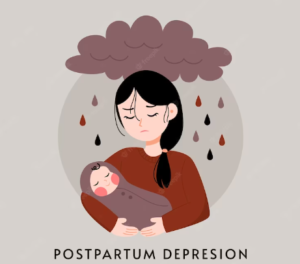Welcoming a new life into the world should be a joyous and fulfilling experience. However, for some new mothers, the period following childbirth can be fraught with emotional challenges, including postpartum depression (PPD). Postpartum depression is a serious mental health condition that affects many women, and it can have a profound impact on both the mother and her baby. In this blog, we will explore various therapies and treatment options available to help women cope with postpartum depression and find their way toward recovery and happiness.
Contents
Understanding Postpartum Depression

Postpartum depression, often referred to as PPD, is a form of depression that occurs after giving birth. While it shares some symptoms with general depression, PPD is uniquely linked to the hormonal, physical, and emotional changes associated with childbirth. It typically manifests within the first few weeks or months after delivery, but in some cases, it can begin during pregnancy or even up to a year after giving birth.
Common Symptoms of Postpartum Depression:
- Overwhelming sadness or hopelessness.
- Loss of interest in previously enjoyed activities.
- Persistent fatigue and trouble sleeping.
- Feelings of guilt, worthlessness, or inadequacy as a parent.
- Difficulty bonding with the baby.
- Irritability, anger, or mood swings.
- Changes in appetite or weight.
- Thoughts of self-harm or harming the baby (seek immediate help if experiencing these thoughts).
The Importance of Seeking Help
One of the biggest challenges of postpartum depression is that it often goes undiagnosed and untreated. Many women feel ashamed or guilty about their symptoms, which can lead to reluctance to seek help. Here are the reasons why it is important to seek help;
- Early Intervention Matters:Just like physical health conditions, mental health issues often benefit from early intervention. Seeking help at the first signs of distress can prevent symptoms from worsening and becoming more difficult to treat. Early intervention can lead to faster and more effective recovery.
- Reduction of Suffering:Mental health challenges can cause immense suffering, affecting all aspects of life. Seeking help can alleviate this suffering by providing coping strategies, tools, and therapies that enable individuals to manage their conditions and lead more fulfilling lives.
- Breaking the Isolation:Many people with mental health issues feel isolated and alone in their struggles. Seeking help allows individuals to connect with mental health professionals, support groups, and loved ones who can offer understanding, empathy, and a sense of belonging. This support can be a lifeline during difficult times.
- Validating Your Experience:Seeking help is a way of validating your experiences and emotions. It acknowledges that what you’re going through is real and significant. Speaking to a mental health professional helps you understand your condition, its causes, and how to address it effectively.
Types of Postpartum Depression Therapies

Fortunately, there are various types of therapies and treatment approaches available to help mothers cope with and recover from PPD. These therapies can be used alone or in combination, depending on the individual’s needs and preferences. Here are some of the most common types of postpartum depression therapies:
Cognitive-Behavioral Therapy (CBT)
- Overview: CBT is one of the most widely used and effective therapies for treating PPD. It focuses on identifying and changing negative thought patterns and behaviors that contribute to depression.
- How It Works: In CBT, individuals work with a therapist to recognize distorted thought patterns and replace them with more balanced and realistic ones. This process helps individuals manage their emotions and develop healthier coping strategies.
- Benefits: CBT is highly structured and goal-oriented, making it a practical choice for many individuals. It is effective in reducing symptoms of PPD and preventing relapse.
Interpersonal Therapy (IPT)
- Overview: IPT is a short-term therapy that focuses on improving interpersonal relationships and communication. It is particularly helpful for individuals who experience difficulties in their relationships due to PPD.
- How It Works: IPT addresses specific issues in relationships, such as role transitions (e.g., becoming a parent), unresolved grief, interpersonal disputes, and communication problems. By resolving these issues, individuals can experience symptom relief and improved relationships.
- Benefits: IPT can be particularly beneficial for mothers who are struggling with bonding issues with their newborns or experiencing conflicts with partners or family members.
Supportive Therapy
- Overview: Supportive therapy provides a safe and empathetic space for individuals to express their feelings, concerns, and experiences. It is often used in conjunction with other therapies or as a standalone approach.
- How It Works: In supportive therapy, the therapist offers emotional support, validation, and encouragement. The focus is on listening and providing a non-judgmental environment for individuals to share their thoughts and emotions.
- Benefits: Supportive therapy can help reduce feelings of isolation and loneliness, which are common in PPD. It provides a sense of connection and understanding, which can be comforting during a challenging time.
Group Therapy
- Overview: Group therapy involves sessions where individuals with PPD come together to share their experiences and emotions under the guidance of a trained therapist.
- How It Works: In group therapy, participants can relate to each other’s struggles, offer support, and learn from one another. It provides a sense of community and reduces the isolation that often accompanies PPD.
- Benefits: Group therapy helps individuals realize they are not alone in their experiences. It can be especially valuable in reducing feelings of shame and self-blame.
Medication
- Overview: In some cases, medication may be prescribed to manage the symptoms of PPD. Antidepressants, particularly selective serotonin reuptake inhibitors (SSRIs), are commonly used.
- How It Works: Antidepressant medications can help regulate brain chemicals related to mood, potentially reducing symptoms of depression.
- Benefits: Medication can be an effective treatment option, especially when symptoms are severe or other therapies have not produced significant improvement. It is essential to consult with a healthcare provider to discuss the risks and benefits, particularly if breastfeeding.
Alternative Therapies
- Overview: Some individuals explore alternative or complementary therapies such as acupuncture, yoga, meditation, or herbal remedies to alleviate PPD symptoms.
- How They Work: These therapies focus on holistic well-being and stress reduction. While they may not be a primary treatment for PPD, they can complement other therapies and promote relaxation and emotional balance.
- Benefits: Alternative therapies can be a valuable addition to a comprehensive treatment plan, providing individuals with additional tools for managing their mental health.
Self-Help and Lifestyle Changes
- Overview: Self-help strategies and lifestyle changes can play a crucial role in managing PPD. These may include regular exercise, proper nutrition, good sleep hygiene, and stress reduction techniques.
- How They Work: These approaches empower individuals to take an active role in their mental health by adopting healthier habits and routines.
- Benefits: Self-help and lifestyle changes promote overall well-being and can enhance the effectiveness of other therapies. They are also valuable in preventing PPD recurrence.
Which Postpartum Depression Therapy to Choose?
Choosing the most appropriate postpartum depression (PPD) therapy depends on various factors, including the severity of your symptoms, personal preferences, and the guidance of a healthcare professional. Here are some considerations to help you decide which PPD therapy or combination of therapies may be the best fit for you:
The Severity of Symptoms:
- Mild Symptoms: If you have mild PPD symptoms, you may initially consider self-help strategies such as exercise, healthy eating, and stress reduction techniques. Supportive therapy or participation in a postpartum support group could also be beneficial.
- Moderate to Severe Symptoms: For moderate to severe symptoms, evidence-based therapies like cognitive-behavioral therapy (CBT) or medication may be recommended, often in combination. Consult with a mental health professional to determine the best approach.
Personal Preferences:
- Therapy Type: Consider which type of therapy aligns with your personality and preferences. For example, if you prefer structured, goal-oriented approaches, CBT may be suitable. If you value emotional support and a safe space to express yourself, supportive therapy or group therapy may be more appealing.
- Medication: Some individuals are open to medication, while others may prefer non-pharmacological approaches. Discuss your preferences and concerns with a healthcare provider to make an informed decision.
Medical History and Health Considerations:
- Medical History: Share your complete medical history with your healthcare provider. Some medical conditions or medications may influence the choice of therapy or medication options.
- Breastfeeding: If you are breastfeeding, discuss the compatibility of medications with nursing with your healthcare provider. Some antidepressants are considered safer during breastfeeding.
Availability and Accessibility:
- Therapist Availability: The availability of therapists specializing in PPD and specific therapies may vary depending on your location. Consider what options are accessible to you.
- Support Groups: Determine if there are postpartum support groups or community resources available in your area. Online support groups can also be an option for those with limited access to in-person resources.
Postpartum Depression and Partner Support

It can also affect partners, although it is more commonly associated with mothers. Partner support plays a crucial role in helping someone with PPD navigate this challenging period. Here are some key points to consider:
- Understanding PPD: Partners should educate themselves about PPD to better comprehend what their loved one is going through. PPD is not a sign of weakness or a character flaw; it’s a medical condition that can be treated.
- Open Communication: Encourage open and non-judgmental communication with the person experiencing PPD. Let them know that you are there to listen and support them, and reassure them that they are not alone in this.
- Offering Emotional Support: PPD can make individuals feel overwhelmed, anxious, and isolated. Offer emotional support by being empathetic and patient. Offer a listening ear and a shoulder to lean on. Express your love and care regularly.
- Practical Help: PPD can make daily tasks seem insurmountable. Offer practical assistance, such as helping with household chores, cooking meals, or taking care of the baby to give the person with PPD some time to rest and recharge.


